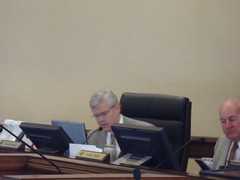Lowndes County is not
“the only community in the country with a MAZ”:
Houston County has very similar zones of encroachment protection around
Warner Robins Air Force Base (RAFB).
As we’ve already seen,
Houston County is buying up houses around RAFB
using $7.5 million from the state of Georgia.
That’s in addition to $6 million from Bibb County and
some unspecified amount from the Defense Department.
Plus Houston County
allocated $7 million from SPLOST funds,
and their SPLOST won by a landslide, apparently partly for that reason.
But what are
 those encroachment zones around Warner Robins AFB
depicted on the buyback map?
I called Houston County to find out.
Their Community Planner, Jacob Cox, said yes, Houston County
has crash zones, and noise attenuation zones in which they can
have businesses but not residences.
those encroachment zones around Warner Robins AFB
depicted on the buyback map?
I called Houston County to find out.
Their Community Planner, Jacob Cox, said yes, Houston County
has crash zones, and noise attenuation zones in which they can
have businesses but not residences.
He pointed me to
The Robins Air Force Base and Middle Georgia
2004 Joint Land Use Study,
which notes:
The 2004 JLUS examines land issues as they relate to RAFB flying
missions and suggests measures to ensure compatible land use in the
Base environs now and into the future. The 2004 JLUS process
utilizes information provided in the 1998 RAFB Air Installation
Compatibility Use Zone study (AICUZ) to evaluate land use
compatibility and regulatory adequacy in areas subject to air hazard
potential and noise impact. Additional considerations related to air
navigation, including air protection surfaces are examined. Clear
Zones and Accident Potential Zones are all considered compatible
with AICUZ guidelines. Incidences of incompatible development are
predominantly restricted to a limited number of non-noise attenuated
residences built prior to 1994.
The results of the 2004 JLUS demonstrate that previously adopted
land use regulations have been effective in limiting incompatible
development within the Base environs. The 1994 adoption of the Base
Environs Zoning District (BEZD) model by the surrounding communities
has served to check most encroachment-type development. Only a very
low number of sporadic, isolated examples of noise-related
incompatible development was observed to have been built since
implementation of the BEZD land regulation strategy. Consistent
local government implementation of adopted provisions must be
maintained in order to continue to provide the protection necessary
to prevent incompatible development from restraining Base operations
in the future.
So as far back as 1994 the communities around RAFB were using zoning
to limit base encroachment.
The 1998 AICUZ recommended further
Clear Zones and Accident Potential Zones.
Why?
Mission changes at RAFB.
So the 2004 JLUS made recommendations and the local governments, including Houston County,
decided to go ahead and do something about it.
Continue reading →
![]() Mike Stucka wrote for Macon.com 6 December 2012,
Deal announces $95 million biomass power plant for Laurens County,
Mike Stucka wrote for Macon.com 6 December 2012,
Deal announces $95 million biomass power plant for Laurens County,









